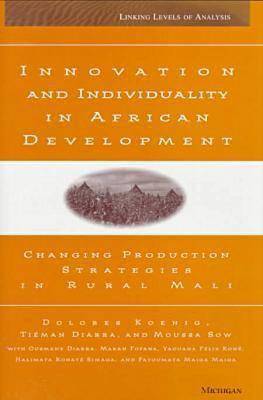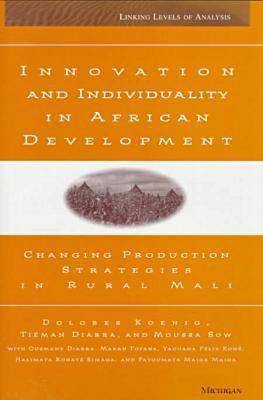
- Afhalen na 1 uur in een winkel met voorraad
- Gratis thuislevering in België vanaf € 30
- Ruim aanbod met 7 miljoen producten
- Afhalen na 1 uur in een winkel met voorraad
- Gratis thuislevering in België vanaf € 30
- Ruim aanbod met 7 miljoen producten
Zoeken
Innovation and Individuality in African Development
Changing Production Strategies in Rural Mali
Dolores Koenig, Tieman Diarra, Moussa Sow
€ 161,45
+ 322 punten
Omschrijving
This book contributes to debates on how to improve development alternatives in West Africa, from the distinctive approach of anthropology--the analysis of local systems. Until now, theoretical frameworks for approaching African development have tended to overemphasize the structural factors that constrain development possibilities (including the colonial past and contemporary political-economic dependency). In Innovation and Individuality in African Development, the authors present a contemporary case study of migrant Malian farmers to illustrate how Africans have tried to improve their lives--and are often successful at doing so.
Using concepts related to human agency (negotiation, innovation, and individual choice), the authors present Africans as active people who have attempted to remake the world in which they live. Introductory chapters situate the study in Malian history and demonstrate that the determination and desire to try new things was present as well in their ancestors' nineteenth-century precolonial states.
Finally, the authors offer practical suggestions about how to improve rural development programs so that more Africans will be able to benefit from positive possibilities for social change.
This volume will speak to anthropologists, international development specialists, and those interested in contemporary Africa, offering a counterweight to much of the contemporary literature that stresses problems rather than solutions.
Dolores Koenig is Associate Professor of Anthropology, American University. Tiéman Diarra is Researcher and Head, Department of Ethno-sociologie, Institut des Sciences Humaines, Mali. Moussa Sow is Secretary General, Ministry of Culture and Communication, Mali.
Using concepts related to human agency (negotiation, innovation, and individual choice), the authors present Africans as active people who have attempted to remake the world in which they live. Introductory chapters situate the study in Malian history and demonstrate that the determination and desire to try new things was present as well in their ancestors' nineteenth-century precolonial states.
Finally, the authors offer practical suggestions about how to improve rural development programs so that more Africans will be able to benefit from positive possibilities for social change.
This volume will speak to anthropologists, international development specialists, and those interested in contemporary Africa, offering a counterweight to much of the contemporary literature that stresses problems rather than solutions.
Dolores Koenig is Associate Professor of Anthropology, American University. Tiéman Diarra is Researcher and Head, Department of Ethno-sociologie, Institut des Sciences Humaines, Mali. Moussa Sow is Secretary General, Ministry of Culture and Communication, Mali.
Specificaties
Betrokkenen
- Auteur(s):
- Uitgeverij:
Inhoud
- Aantal bladzijden:
- 304
- Taal:
- Engels
- Reeks:
Eigenschappen
- Productcode (EAN):
- 9780472108947
- Verschijningsdatum:
- 3/08/1998
- Uitvoering:
- Hardcover
- Formaat:
- Genaaid
- Afmetingen:
- 161 mm x 237 mm
- Gewicht:
- 684 g

Alleen bij Standaard Boekhandel
+ 322 punten op je klantenkaart van Standaard Boekhandel
Beoordelingen
We publiceren alleen reviews die voldoen aan de voorwaarden voor reviews. Bekijk onze voorwaarden voor reviews.








